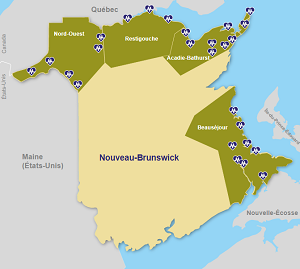Services offered
The NB FASD Centre of Excellence provides prevention, diagnosis, intervention, and support services. The centre pays a great deal of attention to mothers’ needs and trauma and to previous trauma experienced by people with FASD and their families.
Prevention
FASD can be prevented.
To prevent FASD, a woman must not consume alcohol if she is pregnant or may become pregnant. For more information on alcohol and pregnancy, see the section “Pregnancy and alcohol.”
The Centre:
- Distributes information and delivers training and awareness-raising sessions with the goal of developing an FASD-free community;
- Distributes literature;
- Offers telephone or in-person consultations to pregnant women with addictions. Based on their needs, the Centre puts women in touch with mental health services, addiction services, and other community resources.
Diagnosis
It is recommended to assess children as early as possible to:
- Determine their needs;
- Reduce the impact of FASD on their development;
-
Prevent secondary problems such as:
- Low self-esteem;
- Depression, anxiety;
- Failure at school;
- Drug and alcohol problems;
- Problems with the law;
- Inappropriate sexual behaviour.
FASD must be diagnosed by a specialized multidisciplinary team. This involves a physical assessment, language assessment, motor skills assessment, and brain and nervous system development assessment.
Initial assessment
The initial assessment determines whether a child’s behaviour and learning difficulties may be related to alcohol.
The first step is to confirm whether the mother consumed alcohol or other substances during pregnancy that could have affected the fetus.
Tobacco, radiation (x-rays), mercury, certain chemicals, illegal drugs, and even some prescription medications (e.g. antidepressants) can harm the fetus and magnify the effects of alcohol.
If the child or adolescent meets the admission criteria, they are referred for a diagnostic assessment.
Admission criteria for a diagnostic assessment
- Permanent resident enrolled in New Brunswick Medicare
- Age: 0 to 18 years
- Alcohol consumption by mother during pregnancy (confirmed or suspected)
- Consent of the parent or guardian
- Developmental and behavioural disorders
When the Centre receives a referral, a community coordinator or First Nations liaison officer contacts the parents or legal guardian of the child or adolescent on a confidential basis. The coordinator or liaison officer offers:
- Help filling out administrative forms;
- Support to the family during the assessment;
- Support to the family after the diagnosis.
The initial assessment is done in consultation with:
- The child’s daycare or school;
- Mental health, legal, and social services (as needed).
If the first assessment is positive, the child is referred to the Dr. GeorgesL.Dumont University Hospital Centre, in Moncton, for a diagnostic assessment.
Diagnostic assessment in Moncton
The diagnostic assessment takes four days. The assessment is done at the Dr. GeorgesL.Dumont University Hospital Centre by a specialized team made up of a:
- Pediatrician;
- Occupational therapist and speech-language pathologist;
- Psychologist.
During the first three days, the child meets with the psychologist, occupational therapist, and speech-language pathologist.
On the morning of the fourth day, the pediatrician meets with the child and their family. The multidisciplinary team then meets to discuss the results of the child’s assessment. The child’s loved ones and caregivers are invited to attend this meeting. The multidisciplinary team then:
- Makes an accurate and complete diagnosis;
- Makes recommendations based on the child’s needs;
- Prepares the preliminary report that will be given to the family during the afternoon meeting.
Guests may include:
- The school principal, teachers, and guidance counsellor involved;
- Cultural interpreters;
- An addiction counsellor;
- Social workers;
- Staff from mental health services, correctional services, etc.
A meeting with the family or legal guardian takes place on the afternoon of the fourth day. That same day, the family or the legal guardian receives the diagnosis, a preliminary report, and recommendations.
After the diagnosis:
- If FASD is confirmed, the people taking care of the child and the staff in the child’s school (as well as other professionals involved in the lives of the child and their family) are invited to receive training on the condition. FASD involves permanent brain damage. The training helps people understand FASD and how to better help the child. It also helps the parents or tutor determine and obtain the support that the child will need during their life.
This assessment is helpful in finding the best ways to help children with FASD in their everyday lives.
Intervention and support
The regional community coordinators and the First Nations liaison officer:
- Work with the family and community to find the resources recommended at the time of diagnosis;
- Inform the family and community about the community resources available;
- Bring together health professionals working to raise awareness among their colleagues and the population about FASD and its consequences;
- Help people with FASD, their families, and caregivers before and after the diagnosis;
- Offer training to employers (to help them better understand their FASD employees) and to school, college, and university staff;
- Offer support and intervention services to children or adults with FASD.
Who can receive the centre’s services?
- The family of a child aged 0 to 18 who has been exposed to alcohol or other substances during pregnancy and the professionals supporting them
- An adult having been diagnosed with FASD and those providing supporting
Who can request the centre’s services?
- A health professional or a family member of a child
- The family of an adult having been diagnosed with FASD or someone taking care of that adult.
How to request the centre’s services
Telephone: 506-862-3783
Send a message or request information
Request for support for a child or adult already diagnosed with FASD

